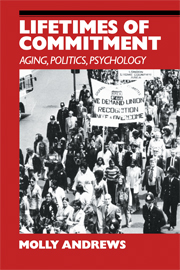Book contents
- Frontmatter
- Contents
- Acknowledgements
- 1 Defying the stereotype
- 2 The potential of social identity theory
- 3 On the subject of subjectivity
- 4 Personal stories
- 5 A nation in turmoil: Britain between the wars
- 6 Radicalization: coming to commitment
- 7 Political conviction and the social self
- 8 Growing into socialism
- Conclusion: aging and sustained purpose
- Notes
- Bibliography
- Index
Conclusion: aging and sustained purpose
Published online by Cambridge University Press: 23 September 2009
- Frontmatter
- Contents
- Acknowledgements
- 1 Defying the stereotype
- 2 The potential of social identity theory
- 3 On the subject of subjectivity
- 4 Personal stories
- 5 A nation in turmoil: Britain between the wars
- 6 Radicalization: coming to commitment
- 7 Political conviction and the social self
- 8 Growing into socialism
- Conclusion: aging and sustained purpose
- Notes
- Bibliography
- Index
Summary
The knowledge of life… which we grown-ups have to pass on to the younger generation will not be expressed thus: ‘Reality will soon give way before your ideals,’ but ‘Grow into your ideals, so that life may never rob you of them.’
Albert Schweitzer (1925: 102)It was more than ten years ago that I first wondered why the many elderly people I saw at demonstrations were excluded from the ‘received wisdom’ of what aging is and should be. Eventually, these vague notions became articulated in more sophisticated academic language. Throughout this time, however, my guiding interest has been the question: does growing up necessarily mean growing out of our ideals? The message of this book can be simply summarized in the one-word answer: No. Psychological development and the commitment to work for social change are not antithetical. Indeed, in the lives of these fifteen people, these two processes have been one and the same.
Western psychology, not surprisingly, tends to reflect the values of Western capitalist ideology. Nowhere is this more true than in its theories of aging; much of the literature describes the later stages of life as a time of disengagement, disillusion, alienation and hopelessness. In Levinson's words, it is a time of ‘preparing for … death … liv[ing] in its shadow, and at its call’ (1978: 38–39). If this is an accurate description of how some people experience the end of their lives, we as a society must ask why this is so.
- Type
- Chapter
- Information
- Lifetimes of CommitmentAgeing, Politics, Psychology, pp. 206 - 207Publisher: Cambridge University PressPrint publication year: 1991



